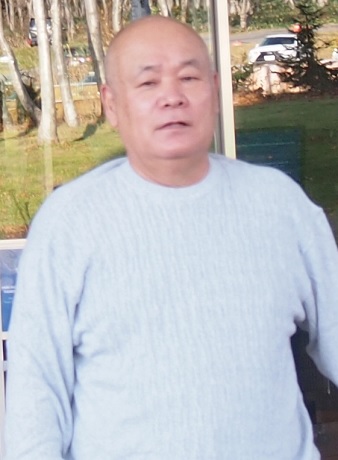


My last Okikamuro Junior High School life was commuting from the top of the mountain at Okajo, the furthest place from the school and the highest point in Kamuro.
On my morning commute to school, the Seto Maru, carrying the last ferry from Sare (that would make it to school on time), would pass the lighthouse, then race down the mountain and go through a tunnel with my classmates from Sare (Omura and Kawamura).I ate lunch at home, so every day I was with Okubo, who was halfway up the mountain. I only had 7 to 10 minutes for lunch at home. If I went past that time I would be late for my afternoon classes. I was always alone on the way to school after lunch.
When I think back to elementary school, we went home for lunch, but from the fifth grade onwards, we started having school lunches. We were given skim milk provided by the US military, and our staple food was a long, thin piece of bread and a few side dishes served in an aluminium bowl. This was the final chapter of Okikamuro's poorest and most materially scarce period. The town was experiencing rapid growth due to the Korean War and the Tokyo Olympics, but the benefits of this did not reach this remote island.
Anyway, my junior high school life was one year after the Tokyo Olympics, and sports clubs were thriving. At Okikamuro Junior High School, there were 3 clubs, and both boys and girls had table tennis, tennis, and volleyball, and students belonged to one of them. The tennis club was for the slightly more fashionable kids, the volleyball club was for the rebellious barbarians, and the table tennis club was for normal people, people with common sense. It seemed like a group of people of different races. Back then, you weren't allowed to drink water when exercising, and you weren't allowed to swim in the sea in summer. Whatever you did, you were given a Spartan education, and if you messed up, you would get punched by a teacher. It will be a big problem if it happened in today's education system.
It was normal that in the third year of junior high school, there were places where classes were divided into exam preparation group and job hunting group, and there was a lot of free time depending on the teacher's mood. The job hunting group was getting in the way of the exam preparation group's studies, so the job hunting group was told to go outside (in the playground) and play #####? They often rebelled against the teachers and played with the job hunting group, and would get scolded by the teachers later.
Maybe I was the last brat to study at the last Okikamuro Junior High School? I think there were a lot of rebellious kids back then, but I could be remembering it wrong. It was a unique island with such a small population that everyone was like a family.
I went to Kudamatsu Technical High School (Kudamatsu City, Yamaguchi Prefecture) for high school, but soon after I entered I was called in by a teacher, and what he said in the staff room was my strong dialect that they couldn't understand. What I was saying in Okikamuro was completely incomprehensible on the Japanese mainland. I was stunned when he told me to speak standard Japanese. I remember being shocked that we couldn't even communicate across the Seto Inland Sea.